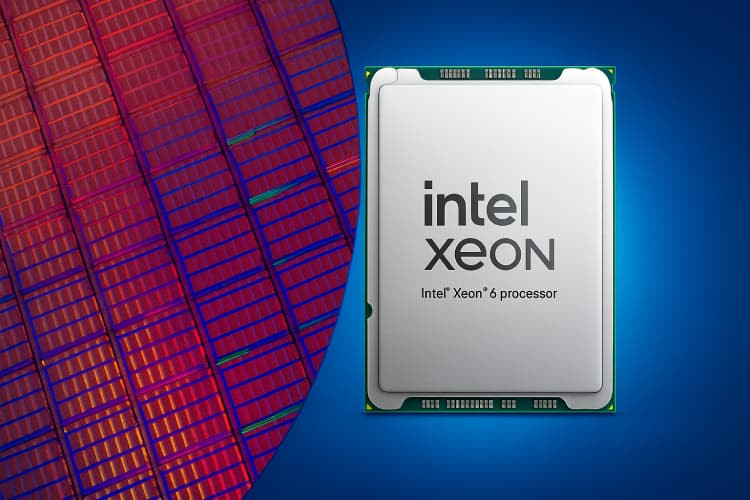Intel Xeon 6 HPC Supercomputer Chosen by Imperial College
Insights | 20-06-2025 | By Matthew Walker

Key Takeaways:
- HX2 is Imperial College London’s new supercomputer, unveiled at ISC 2025, powered by Intel Xeon 6 processors and Lenovo Neptune™ liquid cooling.
- It is the UK’s first academic deployment of Lenovo’s SC750 V4 Neptune platform, hosted in a co-location facility in London.
- The £10 million ICICLE collaboration supports research in AI, climate modelling, medicine, and more—while promoting inclusive training initiatives.
- Neptune’s advanced thermal design removes up to 98% of system heat, enabling energy savings of up to 40% and promoting sustainable HPC infrastructure.
At ISC 2025 in Hamburg, Imperial College London unveiled HX2, its next-generation high-performance computing (HPC) system—a bold leap in academic research infrastructure. Powered by Intel’s latest Xeon 6 processors and hosted on Lenovo’s Neptune liquid-cooled servers, HX2 sets a new benchmark not only in performance but also in environmental stewardship.
As research institutions face mounting pressure to deliver faster, data-intensive results, they also confront a parallel mandate: reduce energy consumption and carbon emissions. Traditional air-cooled systems struggle to meet these demands, making advanced cooling technologies and efficient compute architectures more critical than ever.
This begs the question: Can cutting-edge scientific progress be achieved without compromising the planet? With HX2, Imperial, Lenovo, and Intel appear to be delivering a resounding “yes.”
Inside HX2: Intel and Lenovo Power a £10M Leap Forward
At the core of the HX2 supercomputer is a formidable pairing of hardware and vision. The system is built on Intel Xeon 6 6900P processors, featuring high-performance cores optimised for bandwidth-bound HPC and AI workloads. These CPUs are housed within Lenovo’s ThinkSystem SC750 V4 Neptune servers, renowned for their dense compute architecture and advanced liquid cooling capabilities.
HX2 is hosted in a commercial co-location facility in London, offering a scalable, energy-efficient solution that meets both academic and operational requirements. This move marks the first academic deployment in the UK of Lenovo’s SC750 V4 Neptune platform, underscoring Imperial College’s ambition to lead in next-generation research computing.
Central to this achievement is the ICICLE collaboration, uniting Imperial College London, Intel, and Lenovo in a long-term partnership. This initiative enables access to emerging technologies and research training opportunities, ensuring the system serves not just as a tool, but as an evolving platform for innovation.
Backed by a £10 million investment, HX2 represents a significant upgrade to Imperial’s digital infrastructure—future-proofing the university’s computing capabilities while reinforcing its commitment to environmental responsibility.
Designed for Impact: From Research to Real-World AI
HX2 is more than just a high-performance system—it’s a catalyst for research across Imperial College London. One example comes from Dr. Kelly Zhang in the Department of Mathematics, whose team is leveraging both CPUs and GPUs to develop decision-making algorithms for healthcare. Using the MIMIC ICU dataset, her group aims to improve clinical outcomes through advanced statistical modelling and real-time data analysis.
This is just one of many applications. The HX2 platform is available across all faculties, from engineering and natural sciences to medicine and business, empowering researchers to tackle complex, data-driven challenges that span disciplines.
Crucially, HX2 also serves as a training ground for the next generation of AI and HPC talent. Through the ICICLE collaboration, Imperial is building an environment that supports inclusive innovation, offering students and early-career researchers the opportunity to work with infrastructure typically reserved for industry and national labs.
Liquid Cooling with Purpose: Lenovo Neptune Technology
One of HX2’s defining features is its integration of Lenovo Neptune™ liquid cooling, a technology purpose-built for high-density HPC and AI workloads. The Neptune system removes up to 98% of generated heat using direct-to-node warm-water cooling, allowing the system to operate at peak performance with drastically reduced energy demand.
Compared to conventional air-cooled setups, Neptune enables up to 40% power consumption savings and significantly lowers power usage effectiveness (PUE). Its ability to recapture and reuse waste heat—potentially for district heating—places it at the forefront of sustainable data centre innovation.
Designed for scalability, Neptune cooling supports the compute density required by next-gen AI applications without expanding the system’s physical footprint. This makes it particularly well suited for co-location environments where space and efficiency are critical.
HX2 is not an isolated case—it reflects a wider European shift toward sustainable supercomputing. From Germany to Italy, academic and commercial institutions are increasingly aligning their compute strategies with environmental goals. In this context, Imperial’s investment in Neptune isn’t just a technical upgrade—it’s a statement of intent.
Rethinking the Future of Research Computing
The deployment of HX2 underscores a fundamental shift in how research institutions approach computing infrastructure. As data volumes grow and AI becomes embedded in more fields, sustainability is no longer optional—it is essential. Systems like HX2 prove that environmental responsibility and compute intensity can go hand in hand.
For universities worldwide, HX2 serves as a model. It demonstrates how thoughtful partnerships and forward-looking investment can deliver a platform that is powerful, energy-efficient, and future-ready. Whether the goal is climate modelling, biomedical simulation, or real-time AI inference, such infrastructure is becoming foundational.
Through the ICICLE collaboration, Imperial College London, Intel, and Lenovo are not just responding to the needs of today—they are actively shaping the academic supercomputing landscape of tomorrow. HX2 is more than a system; it’s a blueprint for sustainable innovation in higher education.
Read More:
Could Intel Sell Its Fabrication Business?
Examines speculation around Intel's potential divestiture of its fabrication operations and what it could mean for the global semiconductor landscape.
Intel Architects Launch New RISC-V Startup: AheadComputing Inc
Follows ex-Intel engineers as they launch a new RISC-V startup aimed at challenging traditional processor design paradigms.
Intel Reportedly Exploring Reentry into Memory Market with Japan’s SoftBank
Reports on Intel’s strategic discussions to reenter the memory sector through a potential alliance with SoftBank, signalling renewed ambition in storage tech.
Intel 18A: The Future of Semiconductor Technology with RibbonFET and PowerVia
Analyses Intel’s 18A process node and the significance of its RibbonFET and PowerVia innovations in reshaping next-generation chip architecture.

